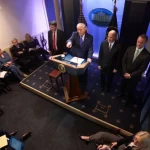

House Speaker Mike Johnson (R-LA) was once a representative who largely flew under the radar and was unknown nationally.
He opposed Ukraine funding in the early days of Russia’s war in Ukraine, but now, as speaker, he must work for compromise in a largely divided Congress, forcing him to change his tune. Going from being a Ukraine funding skeptic to backing more spending isn’t the only position the speaker has changed since rising to the top of the chamber.
And the shifting hasn’t gone unnoticed by Johnson’s allies inside and outside the Capitol.
“House Judiciary Committee Member Mike Johnson has a bone to pick with Speaker of the House Mike Johnson,” Adam Brandon, the president of FreedomWorks, a center-right advocacy group, told the New York Times.
Aid for Ukraine
Johnson was opposed to sending cash support to Ukraine in the early days of Russia’s invasion. At the time, he pointed to problems the United States had at the southern border and the need to address those problems before looking abroad.
“We should not be sending another $40 billion abroad when our own border is in chaos, American mothers are struggling to find baby formula, gas prices are at record highs, and American families are struggling to make ends meet, without sufficient oversight over where the money will go,” Johnson said in May 2022. Russia invaded Ukraine three months earlier in February.
Johnson’s tone has since changed as he feels the pressure from his shrinking Republican House majority, which has been plagued by early retirements and members stepping down.
“We understand the role that America plays in the world,” Johnson said at a news conference last month. “We understand the importance of sending a strong signal to the world, that we stand by our allies and we cannot allow terrorists and tyrants to march through the globe.”
Now, as the speaker, Johnson might be risking his position if he brings a foreign aid bill to the floor for a vote.
Rep. Marjorie Taylor Greene (R-GA) has threatened to oust Johnson if he brings the bill to the floor. House Minority Leader Hakeem Jeffries (D-NY) and Democrats have suggested they will protect Johnson from a motion to vacate if it comes on the heels of a vote on Ukraine aid. But with such a small majority in the House, it’s unclear whether Democrats would pivot and try to place Jeffries in the top position instead.
Stopgap spending bills
When then-Speaker Kevin McCarthy put forth a stopgap bill to fund the government and avoid a government shutdown late last year, Johnson opposed the measure.
Now, Johnson has used multiple stopgap bills to fund the government, compromising with Democrats and dismaying Republican colleagues.
January’s stopgap bill passed in the House by a 314-108 vote, but only about half of Republicans voted in favor of it.
“If you don’t need our votes for the material bills that matter for the country — such as funding the government and our major spending packages — and you continue to pass those under suspension of the rules with predominantly Democratic votes, then don’t presume you’re going to have our votes for the messaging bills that don’t matter, that make us feel better, but are dead on arrival in the Senate,” Rep. Bob Good (R-VA) said.
Surveillance reform
Some Republicans are threatening to sink a vote on Section 702 of the Foreign Intelligence Surveillance Act, a key government surveillance tool. Section 702 allows the U.S. to surveil foreigners suspected of terrorism in other countries.
Before he was the speaker, Johnson advocated huge reforms to the surveillance program. But the changes he is planning on asking the House to vote on are much smaller in scale. As a result, Republicans are threatening to tank the bill.
“The rule is going to be tanked,” Rep. Nancy Mace (R-SC) said. “It sounds like only two votes are needed, as I understand it.”
That intransigence is frustrating the speaker, who said he is trying to find a compromise that achieves at least small wins for FISA reform.
“If our bill fails, we will be faced with an impossible choice and can expect the Senate to jam us with a clean extension that includes no reforms at all,” Johnson wrote. “That is clearly an unacceptable option.”
CLICK HERE TO READ MORE FROM THE WASHINGTON EXAMINER
National security officials also argued the rule is vital to combating threats against the U.S.
“FISA and Section 702 have been essential to intercepting communications of dangerous foreign actors overseas, understanding the threats against our country, countering our adversaries, and saving countless American lives,” Johnson said in a letter to colleagues on Friday. “Our responsibility now is simple: maintain the tool but strictly prohibit future abuses.”







